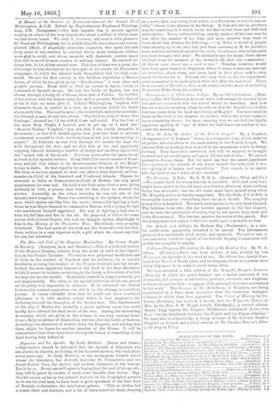A Memoir of the Services of Lieutenant-General Sir Samuel Ford
Whittinghant, K.C.B. Edited by Major-General Ferdinand Whiffing- ham, C.B. (Longmans.)—Our first impulse was to protest against reading an octavo of the very largest size about a soldier of whose name we bad never heard. We read it, however, and read it with pleasure. Sir Samford Whittingham (as ho called himself) was a brave and accom- plished officer, of singularly attractive character, who spent the first forty years of this century in services which more fortunate soldiers were glad to avoid, and whose memoirs will, therefore, contain much that will be novel to most readers of military history. He entered the Army late, in his thirty-second year. This loss of time was a great dis- advantage to him throughout the best part of his career, his Peninsular campaigns, in which his inferior rank disqualified him for high com- mand. He saw his first service in the luckless expedition to Buenos Ayres, of which he has given in his " Recollections " a very clear and graphic account. From 1808 to 1S14 he served in Spain, chiefly in command of Spanish troops. Ho saw the battle of Baylon, but was absent, through a lucky fit of illness, from that of Tudela. An incident of his retreat with the beaten army has such a genuine Spanish flavour about it that we must give it. Colonel Whittingliam, helpless with rheumatic fever, is carried in a cart, on a mettle's, which his doctor -shares with him. The cart is upset ; the doctor falls under the mattress ; the Colonel, a man of vast size, above. " For the love of God ! Senor Don Santiago," shouted he, "I am stifled, I am suffocated. For the love of the most Holy Virgin, I beseech you to get up, or I shall die." " Dearest Turlan," I replied, " you see that I am totally incapable of movement ; so that if it should appear that your last hour is arrived, recommend yourself to God ; for from human aid you have nothing to -expect." At Talavera he was shot through the mouth, but kept the field throughout the day; and we find him at the end apparently enjoying himself, drinking a tumbler of sherry and smoking cigars with the "sound side of his mouth." For four years after the peace he re- m:tined in the Spanish service. From 1820-2 lie was Governor of Domi- nica, and left that island to be Quartermaster-General of the King's troops in India. In that capacity he assisted at the siege of Bhurtporo. His term of service expired, he went out, after a brief interval, as Com- mander-in-Chief of the Leeward and Windward Islands. Thence he returned to India as Commander-in-Chief of Madras, the only good appointment he ever had. He held it for little more than a year, dying suddenly in 1811, a poorer man than he was when he entered the service. Assuredly, as the editor remarks, he was not one of the -Queen's hard bargains. There was something of the Quixote about the man, which makes one like him the more ; witness his fighting a duel, when he was Major-General in command at Meerut, with a young Ensign who considered himself aggrieved. His way of fighting a duel was to turn his full face and fire in the air. He proposed to follow the same course with Colonel Napier, who had, he thought, spoken slightingly of him in the History of the Peninsular War. His friends very properly interfered. The best parts of the book are the General's own recollec- tions, written in a very vigorous style, a gift which we cannot say that his son has inherited.






























 Previous page
Previous page